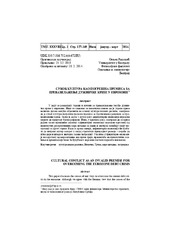Prikaz osnovnih podataka o dokumentu
Sukob kultura kao pogrešna premisa za prevazilaženje dužničke krize u evrozoni
Cultural conflict as an invalid premise for overcoming the eurozone debt crisis
| dc.creator | Radonjić, Ognjen | |
| dc.date.accessioned | 2021-10-12T11:58:01Z | |
| dc.date.available | 2021-10-12T11:58:01Z | |
| dc.date.issued | 2014 | |
| dc.identifier.issn | 0353-7919 | |
| dc.identifier.uri | http://reff.f.bg.ac.rs/handle/123456789/1823 | |
| dc.description.abstract | U radu se razmatraju uzroci i načini za prevazilaženje tekuće dužničke krize u evrozoni. Iako se slažemo sa nemačkim stavom da je uzroke krize velikim delom moguće objasniti na osnovu kulturoloških razlika, smatramo da je sukob kultura pogrešna polazna premisa za propisivanje recepata za prevazilaženje krize. Jasno je da će u dugom roku deficitarne ekonomije evrozone morati da preduzmu bolne reforme. Ipak, u kratkom roku, smatramo da se kriza jedino može prevazići ukoliko suficitarne ekonomije evrozone odustanu od nametnutih restriktivnih mera štednje sa jedne i značajno povećaju svoju potrošnju sa druge strane. Kada se kriza sanira, deficitarne ekonomije bi trebalo da naprave oštar zaokret u svojoj strategiji privrednog razvoja - moraće da puno rade i štede i značajno smanje potrošnju. Ukoliko suficitarne ekonomije ne odustanu od mera štednje dok kriza traje, procvetaće ekstremistička osećanja i organizacije čime će budućnost evrozone postati izrazito neizvesna. | sr |
| dc.description.abstract | This paper discusses the causes of and ways to overcome the current debt crisis in the eurozone. Although we agree with the German view that the causes of the crisis could be, to a great extent, explained on the basis of cultural differences, we also believe that using cultural conflict as a starting premise for the prescription of remedies for overcoming the crisis is erroneous. It is clear that in the long run the deficitary eurozone economies will have to undertake painful reforms if they intend to persevere. However, this paper argues that in the short run the only way to overcome the crisis is to abandon austerity measures imposed to deficitary countries on the one hand, and increase the consumption of eurozone surplus economies on the other hand. Only when stability is restored again will there emerge conditions for deficitary countries to make a sharp turn in their economic development strategy - they will have to work hard and significantly increase savings and decrease consumption. If the surplus economies do not forgo the imposed austerity measures in the midst of the crisis, extremist sentiments and organizations will flourish, thereby making the future of the eurozone highly uncertain. | en |
| dc.publisher | Univerzitet u Nišu, Niš | |
| dc.relation | info:eu-repo/grantAgreement/MESTD/Basic Research (BR or ON)/179035/RS// | |
| dc.rights | openAccess | |
| dc.rights.uri | https://creativecommons.org/licenses/by-nc-nd/4.0/ | |
| dc.source | Teme | |
| dc.subject | potrošnja | sr |
| dc.subject | Nemačka | sr |
| dc.subject | mere štednje | sr |
| dc.subject | kulturološke razlike | sr |
| dc.subject | Grčka | sr |
| dc.subject | Greece | en |
| dc.subject | Germany | en |
| dc.subject | cultural differences | en |
| dc.subject | consumption | en |
| dc.subject | austerity measures | en |
| dc.title | Sukob kultura kao pogrešna premisa za prevazilaženje dužničke krize u evrozoni | sr |
| dc.title | Cultural conflict as an invalid premise for overcoming the eurozone debt crisis | en |
| dc.type | article | |
| dc.rights.license | BY-NC-ND | |
| dc.citation.epage | 149 | |
| dc.citation.issue | 1 | |
| dc.citation.other | 38(1): 127-149 | |
| dc.citation.rank | M24 | |
| dc.citation.spage | 127 | |
| dc.citation.volume | 38 | |
| dc.identifier.fulltext | http://reff.f.bg.ac.rs/bitstream/id/674/1820.pdf | |
| dc.identifier.rcub | https://hdl.handle.net/21.15107/rcub_reff_1823 | |
| dc.type.version | publishedVersion |

